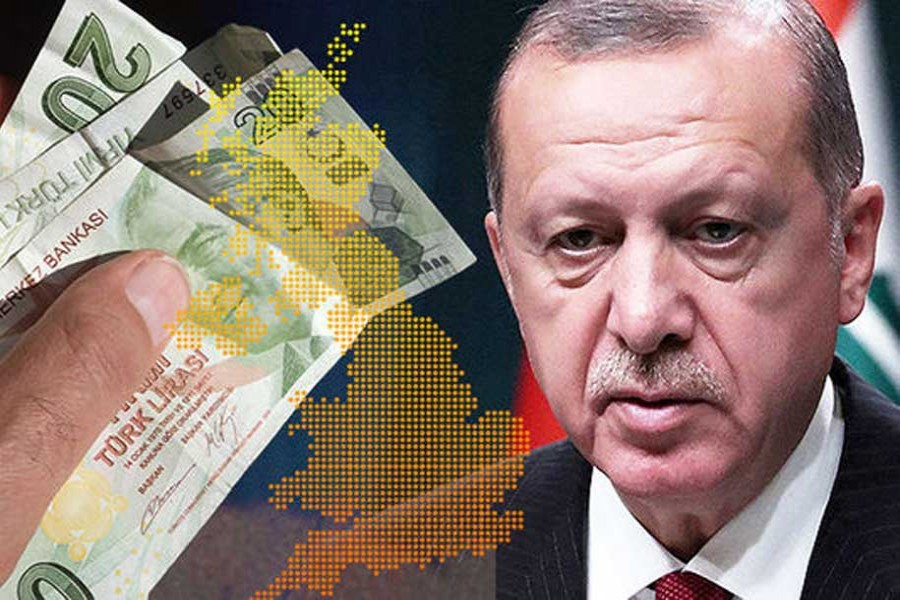Istanbul plays an oversized role in the Turkish economy and politics. It has been the gateway to the presidency for Recep Tayyip Erdogan and represents a third of the country's economy.
After a quarter of a century, Erdogan lost the battle to control the financial capital but controversially another vote to elect the mayor has been planned.
It is just one of a number of issues that has many people and businesses losing faith in the country. After a credit-fuelled boom led to bust many are switching to the dollar. Foreign exchange deposits and funds rose to a record high of $182bn this month.
The lira has fallen about 37 percent since the beginning of 2018, pushing the economy into recession. The central bank has stopped short of implementing capital controls on the way governments limit the flow of money in and out of the country. During the boom years, delivered mostly through property and construction, corporations borrowed in dollars and are now finding it difficult to repay $200bn in loans.
Meanwhile, unemployment has jumped to a decade-high of 14.7 percent and inflation soared to 19.5 percent. The Turkish government has promised a series of financial reforms to revive the economy. But for now, many consumers are struggling to pay for imported goods.
Where did it all go wrong for the economy?
"In 2008, our GDP per capita was above $8,000 and it raised up to $12,000. But today we are below the 2008 numbers," says Durmus Yilmaz, former central bank governor. "The reason behind it is the chosen growth model. You can't be a big economy with the skyscrapers you build in Istanbul, Ankara or Izmir, but they can be your prestige projects."
"Turkey shall never capitulate them. All infrastructure, canal, railway, fast train projects must continue, even with [a] foreign subsidiary. Because these are the essentials of an economy. However, a substantial part of foreign money we received has been allocated to a construction sector that feeds 750 different sub-sectors. This created a boom in the economy. But at the end, your cash flow is in local currency but your debt is in foreign exchange. So we are stuck now."
In order to fix the Turkish economy, he says "our job is to follow token economy policies and build up the country's interest accordingly. As the opposition, we and others say the finance and treasury minister, the president's son-in-law, should resign. But this will not resolve the problem. This is a systemic issue. This system has paralysed the decision-making process in the economy. If you monopolise the authority, that person manages all."
"We have to address the key trigger of the problem, which is this new presidential system, which is unique to Turkey. Our institutions are now paralysed. We need to rebuild our system by introducing a rule-based system in line with universal law, separation of powers, checks and balances. Otherwise, I believe the current system will self-terminate," Yilmaz says.
Mozambique's debt crisis
Mozambique is hoping to secure billions of dollars for reconstruction after the devastation of cyclones Idai and Kenneth. Cyclone Idai alone left more than 600 people dead and about 1.8 million people in need.
According to the United Nations, Mozambique needs $3.2bn for post-cyclonereconstruction. The International Monetary Fund (IMF) says growth could slow to at least 1.8 percent from 3.5 percent from losses to agriculture, transport and communications. Food shortages in Beira, one of the hardest-hit cities, and surrounding areas could push prices up 8.5 percent from 5.5 percent.
Mozambique's port of Beira is an important hub for the country, as well as for neighbouring Malawi and Zimbabwe. But it is not operating right now. And according to the finance ministry, most homes, hospitals and schools had suffered large-scale destruction.
A debt crisis has complicated Mozambique's finances.
In 2016, it admitted to $1.4bn in undisclosed funding. That prompted the IMF to cut off support, triggering a currency collapse and debt default. It has little hope of repaying the debt.
In 2017, the debt-to-GDP ratio was 112 percent. By 2022, the IMF forecasts that it could climb to over 130 percent. But the country is resource rich. It hopes to become the next liquified natural gas powerhouse. By 2025, Mozambique is on track to invest $128bn. But it would still be many many years before it gets over its debt crisis and begins to reap the benefit of the gas.
Anish Kapadia, managing director of Akap Energy, says, "some of the debt was clearly fraudulently issued and then you've got the more conventional eurobonds that were issued as well. In terms of that fraudulently issued debt, there's a good chance that Mozambique may be able to get that written off ..."
"In terms of the eurobond issue, I think it makes sense for the Mozambique government to come to some kind of an agreement with the debt holders to move forward because the main thing is that Mozambique needs to be in a position where it can raise further debt going forward from really benefit from the full potential of the LNG projects in the country."


